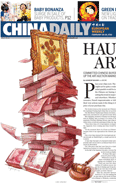Practical Info
Guide to journey through spice land
Updated: 2011-02-11 07:47
By Erik Nilsson (China Daily)
Hunan province is a place where the spice of life is a life of spice, where the chili pepper fuels the fire that burns in local people's souls.
That's perhaps why images of two of the fiery fruits crisscross the cover of Hunan: The Hometown of Chairman Mao Zedong, framing the quote: "Spice, embodying the essential spirit of Hunan people, is like a signpost leading straight to (their) hearts".
And it's perhaps why the book's opening sentence reads: "It goes without saying that the person at the table who likes the spiciest food is from Hunan province."
The chili pepper continues to flavor the book until the back cover, serving as a uniting theme that brings the various ingredients of what makes Hunan, Hunan, to the same table.
Hunan: The Hometown of Chairman Mao Zedong is an essential primer to the province, a book of spells that conjures the best of what makes this land enchanting. It provides a comprehensive introduction to the local culture, politics, history, geography, geology and travel offerings - everything everyone should know about the place.
It introduces a cast of characters from the province's past and present, including revolutionary heroes, giant salamanders, ancient sages, dragons, real-life mummies and magical medicine men. And, of course, it details the exploits of its namesake protagonist, that son of Hunan who became the father of New China, Chairman Mao Zedong.
The book takes readers from the bottoms of the province's deepest caves to the peaks of its highest mountains, from its primeval forests to its rapidly developing cities, and from the darkest trials of its war-stricken past to the brightest points of its harmonious future.
The book is filled with fun factoids, sprinkled throughout its staple narratives like so many chilis.
Readers learn about nu shu, the language written exclusively by the ethnic Yao women of Hunan's Jiangyong county. And they can discover how these "mosquito-shaped words", which for at least two millennia have been created using only four kinds of strokes, may provide a lasting link to China's matrilineal past.
And readers will also discover that Hunan is home to not only the oldest known specimen of farmed rice, discovered in Daoxian county, but also to the latest innovation in rice cultivation - the hybrid "super rice" variety developed by agrarian scientist Yuan Longping in the provincial capital, Changsha.
And readers will learn about the legacies of Shennong, the "Divine Farmer", who is credited with inventing agriculture about 5,000 years ago. They will also delve into the tales of Cai Lun, who invented plant-fiber paper in 105 AD, and Wei Yuan, who created China's first atlas of foreign geography in the 1840s.
Hunan: The Hometown of Chairman Mao Zedong is a must-read book about a must-see place.
Reading this book will entice travelers to visit Hunan and add spice to their journeys through the province.
E-paper

Online shops boom in China
Low investment, quick returns offer profit-making opportunities for struggling students.
Something 'fishy' about this trick
Banking on success
Branded outlets move in
Specials

The green lantern
Environmental concerns are shedding new light on a colorful tradition

Inland interchange
Chongqing bets on its position as a hub for China's west.

Zooming in on Chinese skies
Helicopter companies ride on country's growing interest in luxury aviation.
